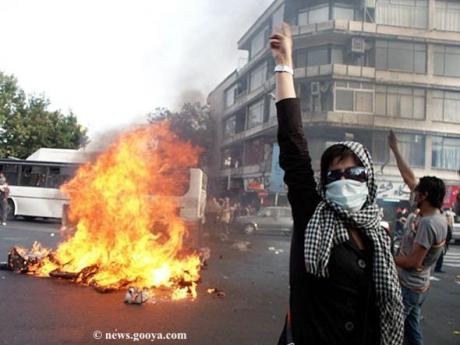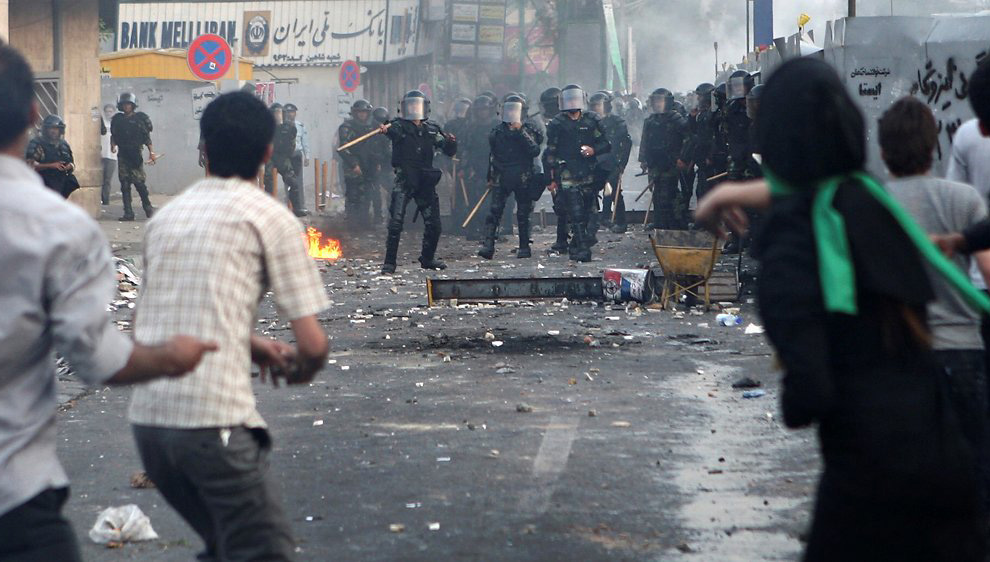
The protest movement in Iran has grown beyond asking for a simple reform of the evil Islamic regime preached by so called reformers. Meanwhile the remainders of reformers in the expat communities, completely beleaguered, are trying hard to revive the discredited theory of “bargaining on top”. One day they plead with powerful individuals to intervene on behalf of defeated reformists and bring the situation back to its pre elections status and the next day they promise to form a new political party that would exclude some of the old players like the “Mosharekat, Islamic revolution Mojahedin or Kagozaran party”. Karoubi tried in vain to form a new reformist party four years ago without achieving any results.
Although, the stupidity and confusion of the remainder of reformists to come up with such tactics against a police state who wants to eliminate them completely from the political scene might surprise the masses that have come to the streets with radical demands, but is not at all uncommon.
No one expects Mousavi and Karoubi to go beyond calling for Allaho Akbars, Islamic pray or Friday prayer as forms of protest.
Mousavi and Karoubi are asking the same government who cheated in the elections to grant them the permission to form a political front and are warning their supporters against questioning the fundamentals of the regime.
By calling the situation a “family fight” Mousavi who is the loser in the Khamenei-Ahmadinrjad game, is trying to at least bring it back to its pre elections status. What he doesn’t understand is that especially after June 20th Khamenei himself has become people’s main target and hence there is no turn back.
By continuing its repressive and violent policies, the ruling faction is making it harder to go back to normal and at the same time alienating further the large middle class population who supports Mousavi.
The main characteristic of the movement after June 20th has been its radicalism and its disconnect from the so called reformist leaders. In other words within the ten days following the elections the movement changed from a silent protest demanding new elections to street fights trying to overthrow the regime. This surpassed even the demands of the most radical factions of the reformists.
At a time when wide spread protests and new popular initiatives have put the possibility of a new revolution more and more in sight, some reformist supporters who themselves “movement’s spokesmen in exile” are waiting for a miracle or divine hand to bring their faction back to power. Let us have a closer look at these divine hands and their playground:
- Makhmalbaf and some his friends who were late to join the green movement overseas argue that Mousavi needs to bring the people to the streets. The fundamental question is why Mousavi should do so and what will he achieve by bringing people to the streets?
As Mousavi said it himself in his statement after the fiasco of ballot recount, his supports should limit themselves to legal protests and avoid slogans that tend to question the fundamentals of the regime. Any disobedience from Mousavi’s part will put him in opposition to the principle of supreme leadership and therefore the Islamic republic itself. This goes against the reformists’ interests and ideology. The reformists do not want to overthrow the Islamic republic. On the contrary they want the continuation of the current regime and will be happy to remain in the sidelines of the political power.
- Kadivar and some reformist clergy question the religious legitimacy of the government. After getting disappointed with some of their most powerful supporters in the regime, namely Rafsanjani and Nategh Noori, they started pleading with the Grand Ayatollahs. With the exception of Montazeri and Sanei the rest of them limited their actions to issuing toothless statement and avoided confronting the devil.
The assembly of experts, the expediency council and all the rest of the clerical bodies were so afraid to have a similar fate to Shariatmadari and tens of other dissident clerics that they opted not to oppose Khamenei openly.
Furthermore issuing a fatwa on the lack of religious legitimacy or ability of the government will only be efficient if the majority of the religious supporters of the regime react positively to it. Not only these fatwas do not impress the supporters of the regime who for the most part are religious, but the general population is so disillusioned by religion that it will not get motivated by them. Even if they succeed in motivating the people how will they change the current government’s behavior. No one will find any consolation in a fatwa that all of sudden declares illegitimate actions of a regime that has been illegitimate all along.
- Farokh Negahdar and most of the ex members of Fedayin( Majority) are preaching for a step by step policy and putting pressure on the leadership of the regime through a range of means without destabilizing the system. But in reality no internal means are left to pressure the regime so the bargaining game could go on top. The step by step policy and promises of a future election are of no use to people who are fighting the military and security forces in the streets. Why should people believe in this game again when Karoubi himself feels ashamed for not listening to those who were warning of the vainness of elections in the Islamic republic?
- Mohsen Sazegara and other radical reformists outside Iran want to organize civil protests. According to this group, organizing limited strikes and safer types of demonstrations could help destabilize the system. The question remains what will be the main objective of these safe middle class tactics? Do the reformists intend to seize the political power by relying on people’s power and an uprising? The answer is no. Sooner or later these reformist ideologues theoreticians have to explain to people who are taking to the streets despite the advice of different factions, the objective of their suggested protests in the current political deadlock.
- The green united front is the solution offered by a range from the right wing parties going to half democrats who lately joined the green movement outside Iran. This group that includes Tudeh party, Fedayin of People(Majority ), some monarchists and a whole range of other people with no affiliation jumped the band wagon of the green movement one week before the elections not to miss the post election party. After weeks of confusion they now want to board the movement’s band wagon. With their unity slogans they want to claim the movement their own. But the first question this group needs to answer is this: Should we overthrow the Islamic republic with a revolution or by revolutionary gestures? Answering this question will not be easy for those who up until yesterday were trying to infiltrate the regime or reforming it. · Nabavi and his friends want to start a green television and media. They believe the only thing missing in the protest movement inside Iran is its own green media. What will differentiate this new media from Roozonline and other reformist Internet sites is a question they intend to answer only after establishing it. Does this satellite green television plan to teach new ways of protest or is it going to call for a more organized way of struggle? And if so, will this new media act more like a brake or an accelerator to this movement? Why should a satellite TV station be established by those who have nothing but outdated lectures to give to the people? Which one their previous analyses have become true and which one their guidelines have become useful to people who are fighting in the streets?
It is said that one day Mollah Nasredin saw two people who were fighting. He took his blanket and started running away. When asked why he was running away since they were not fighting him, he answered: Don’t you know that their fight will end up being over my blanket?
Our story is quite similar to Molla Nasredin’s story.The “family fight” between the so called reformists and hardliners is not our fight. People’s demands go beyond what the reformists who believe in the system can possibly deliver. The masses have shown that “the game of powerful” is not their game. If the middle classes succeed in bringing the working classes to it side and turn on the engine of the revolution and only then all these political flirting will go to its rightful place; the trash can of history. This is what happened during the 1979 revolution and will inevitably happen again in a “revolutionary situation”.
The masses are reaching to a point of no return; or they will get defeated due to the lack of organization and theory and therefore will have to take their protest underground or once for all in the streets with a general strike will close forever the old book of defeat and open a new page in the history.
Published in:
Also in:
Related Article:







